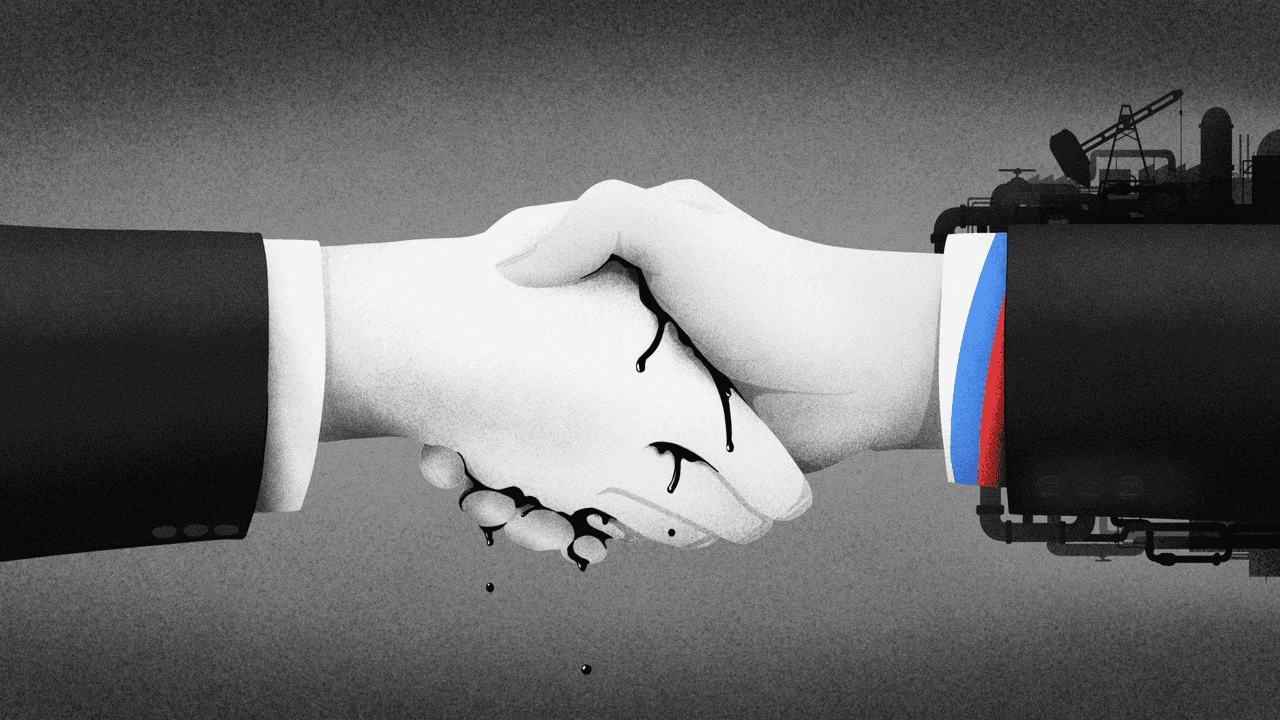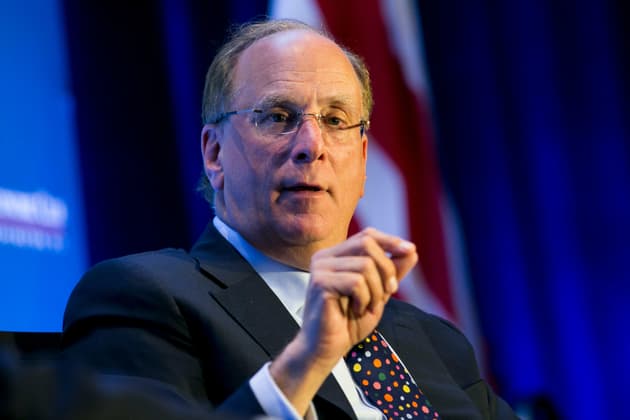
BlackRock ploughed UK pension funds into Putin’s war chest
Millions of British pension-holders have helped build the immense Russian war chest that emboldened Vladimir Putin to invade Ukraine, the Bureau of Investigative Journalism can reveal.
The asset-management giant BlackRock, which manages pensions for more than 10 million people in the UK, has invested huge amounts in Russian state-owned energy and banking enterprises in recent years. These companies have contributed to Russia amassing $630bn in foreign reserves – a financial position crucial to Putin’s decision to invade Ukraine.
BlackRock had reason to reconsider its investments in Russia in March 2014, when Putin breached international law by sending troops into Crimea. The firm initially reduced some of its Russian investments – and CEO Larry Fink saluted a victorious “economic war” – but one year on it was still among the top shareholders in the country's biggest companies, and remains so today.
Since then, BlackRock has earned more than $1.3bn in dividends for its clients through its shareholdings in 10 of Russia’s most important companies, the Bureau’s analysis of Bloomberg data has found.
“It was clear that Putin was a tyrant eight years ago,” Kira Rudik, the leader of Ukraine's Voice party told the Bureau, “and the fact that the whole modern world was still continuing doing business with him, and making money there, results in what we see right now.”
The Bureau analysed BlackRock’s holdings over the past eight years in 10 companies that form the mainstay of Russia’s economy: Gazprom, Rosneft, Sberbank, VTB, Transneft and Alrosa – which are all part state-owned – as well as Lukoil, Tatneft, Novatek and Nornickel.
Many of these companies have now been sanctioned by the West. The US has cut off Sberbank from its financial system and frozen assets at VTB, as well as heavily restricting companies deemed critical to the Russian economy – including Gazprom, Transneft and Alrosa – from raising money through the American market. There is no suggestion BlackRock has acted unlawfully or breached any sanctions.
These companies have provided vital financial support for Putin’s regime. Over the past eight years, the Russian government received $46bn in dividends from its holdings in six of those companies.
Private companies have also helped line Putin’s war chest. “Oil production in particular is very heavily taxed,” said Anders Åslund, a former economic adviser to both Russia and Ukraine. When the oil price is high, he said, the state benefits more than the owners of the oil companies.”
Almost 40% of the government’s income over the past eight years came from oil and gas revenues, according to data from the Russian ministry of finance.
BlackRock told the Bureau: “Prior to the Russian invasion of Ukraine, the exposure to Russia in our clients’ portfolios represented less than 0.2% of BlackRock’s assets under management. Following the invasion, BlackRock moved quickly to suspend the purchase of any Russian securities. BlackRock is monitoring the direct and indirect impacts of the crisis and working with our clients to support them as they take appropriate investment action.”
Buying at the sound of cannons
When investors responded to the 2014 annexing of Crimea by selling their holdings in Russian companies, which sent share prices into a nosedive, Fink seemed happy to take credit for punishing Putin.
“The marketplace has said that if you play these games, you are not going to have our capital,” Fink told the Sunday Times at the time. “Instead of having physical war we had economic war. And in one day, Russia lost. That’s a proud moment for me. If you are going to have my pension fund flows in Russia, you have to stand by international law. I would not invest in Russia at this time, not until it wants to be part of the global community.”
Five days before those comments were published – on the day Russian troops threatened to shoot unarmed Ukrainian soldiers in Crimea – it emerged that BlackRock had been busy buying up cheap Russian stocks.
“Events in Ukraine, particularly in the Crimean peninsula, have caused severe volatility in emerging European markets,” said BlackRock fund manager Sam Vecht at the time. “We are using the opportunity […] to accumulate some extra stock in Russian positions.”
 Larry Fink said the 2014 fall in Russian stock prices was 'a proud moment'
Kristoffer Tripplaar / Alamy Live News
Larry Fink said the 2014 fall in Russian stock prices was 'a proud moment'
Kristoffer Tripplaar / Alamy Live News
BlackRock did reduce some of its Russian holdings in 2015 but has since added substantially to those investments. The firm said clients held more than $18.2bn in Russian assets at the end of January this year.
Vecht later said his fund’s returns against an “astonishing” backdrop, which included the annexation of Crimea, showed that “it’s much easier to make excess returns when others are panicking”. In a research report at the time, Mel Jenner, an analyst at the financial research firm Edison, said a simple principle lay at the heart of the fund: “Buy at the sound of cannons and sell at the sound of trumpets.”
While BlackRock has taken credit for this financial success, it has also responded to criticism by arguing that many of its funds are invested through indices compiled by external providers. However, the company proved itself capable of decisive action on the fifth day of Russia’s current invasion of Ukraine, when it stopped all purchases of Russian assets, including in its index-linked funds.
The firm said it believed this policy “reflects BlackRock’s and our clients’ values”. But BlackRock, which positions itself as a leader in environmental, social and governance (ESG) investing, had not been shy of investing in Russian shares in the preceding days.
The firm had invested 9% of a $960m hedge fund in Russian shares in January – a bet which Vecht said he raised even further when the invasion began, according to a Bloomberg report. And it spent $16m on shares in the Russian gold miner Polymetal the day after Russian tanks moved into Ukraine.
BlackRock told the Bureau that these trades would not have been permitted by its current policy.
“That is, of course, vulture capitalism,” Åslund said. In his view: “If you're supporting war, you are not supporting [ESG principles].”
The draw of dividends
Even through a purely financial lens, BlackRock’s recent bets on Russia might now look ill judged. The Moscow stock exchange almost tripled in value from April 2014 until the end of last year but share prices plummeted as Russian tanks prepared to enter Ukraine this year, wiping out much of the previous gains. Global sanctions and shuttered markets left investors unable to sell. BlackRock has marked the value of its Russian assets down to zero but those could rise again when markets reopen and sanctions lift.
BlackRock’s clients have, however, benefited from the Russian companies’ generous shareholder dividends. These are a key factor in rewarding foreign investors for their bets on Russian companies, according to Félix Boudreault, managing partner at the research firm Sustainable Market Strategies.
In Boudreault’s opinion: “It is just like what tobacco is doing, and Big Oil. You pay for the investors to forgive your sins […] They need to reward you, so you don’t think too much about what you’re investing in.”
He added that the role of Western investors in Russian companies is likely to prompt “a lot more questions from pensioners – not just on what [money is invested in], but where”.
Tony Burdon, CEO of the campaign group Make My Money Matter, said: “Whether it’s vegans investing in factory farming or regular UK savers enabling Putin’s war, the contradictions between the values of everyday pension holders and their investments is stark.”
He urged pension funds to disclose the impact of their investments and use their buying power “to drive pressure on asset managers, especially those with enormous influence”.
Rudik, the Ukrainian MP, has questions for BlackRock: “What matters more, [a company’s] reputation or the funds? I’m sure that people who are in business for so long know that funds are easy, money is easy, but reputation is hard. Investing [the dividends] in rebuilding Ukraine and supporting Ukraine would be a fair move. It will even out the money that is used right now to destroy us.”
Reporters: Josephine Moulds, Soobin Kim, Matthew Chapman and Simon Lock
Finance editor: Franz Wild
Global editor: James Ball
Bureau editor: Meirion Jones
Production editor: Alex Hess
Fact checker: Samuel Horti
Illustrator: Daniel Stolle
Legal team: Stephen Shotnes (Simons Muirhead Burton)
Our Enablers project is funded by Open Society Foundations, the Hollick Family Foundation and out of Bureau core funds. None of our funders have any influence over the Bureau’s editorial decisions or output.





